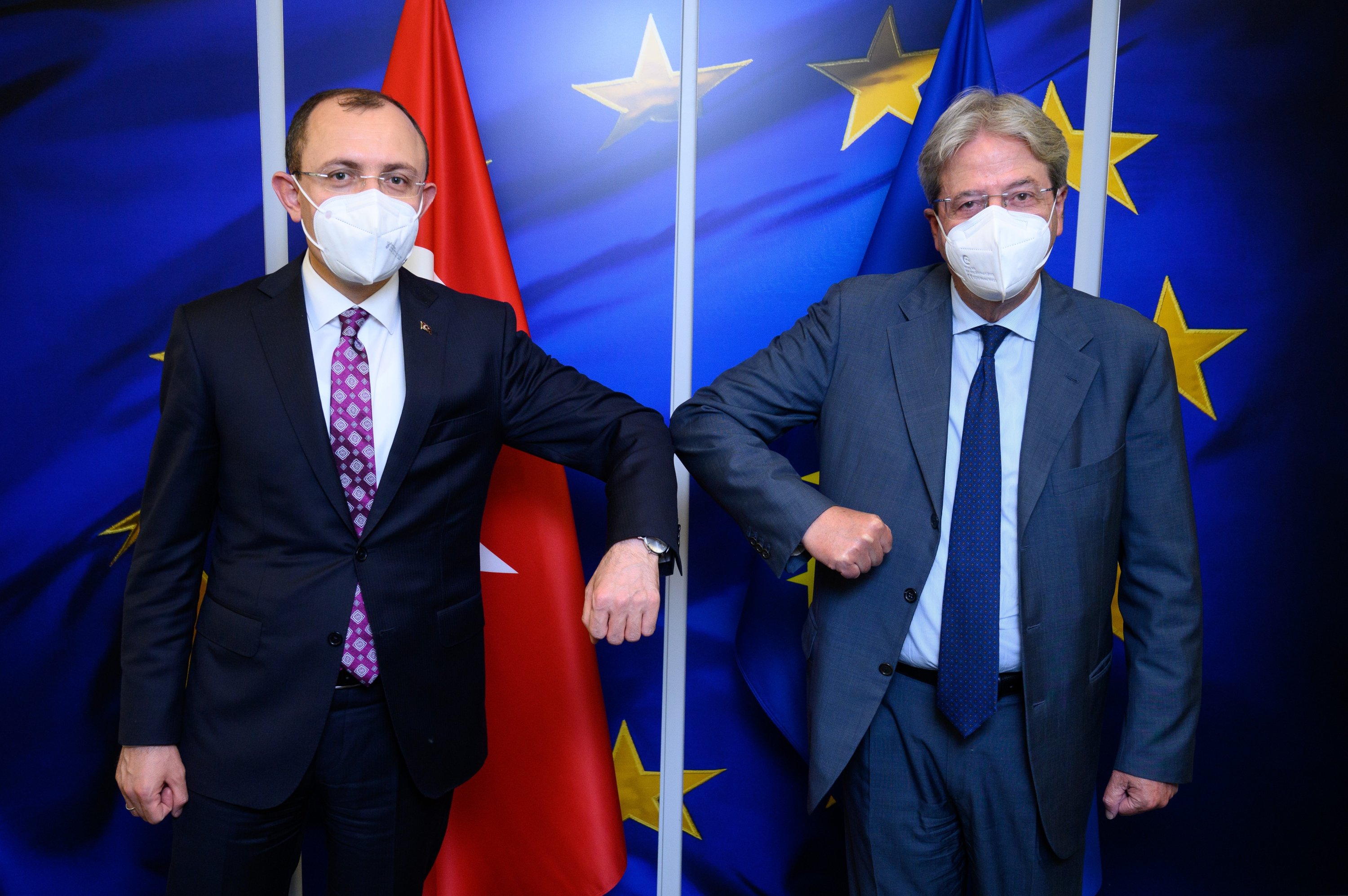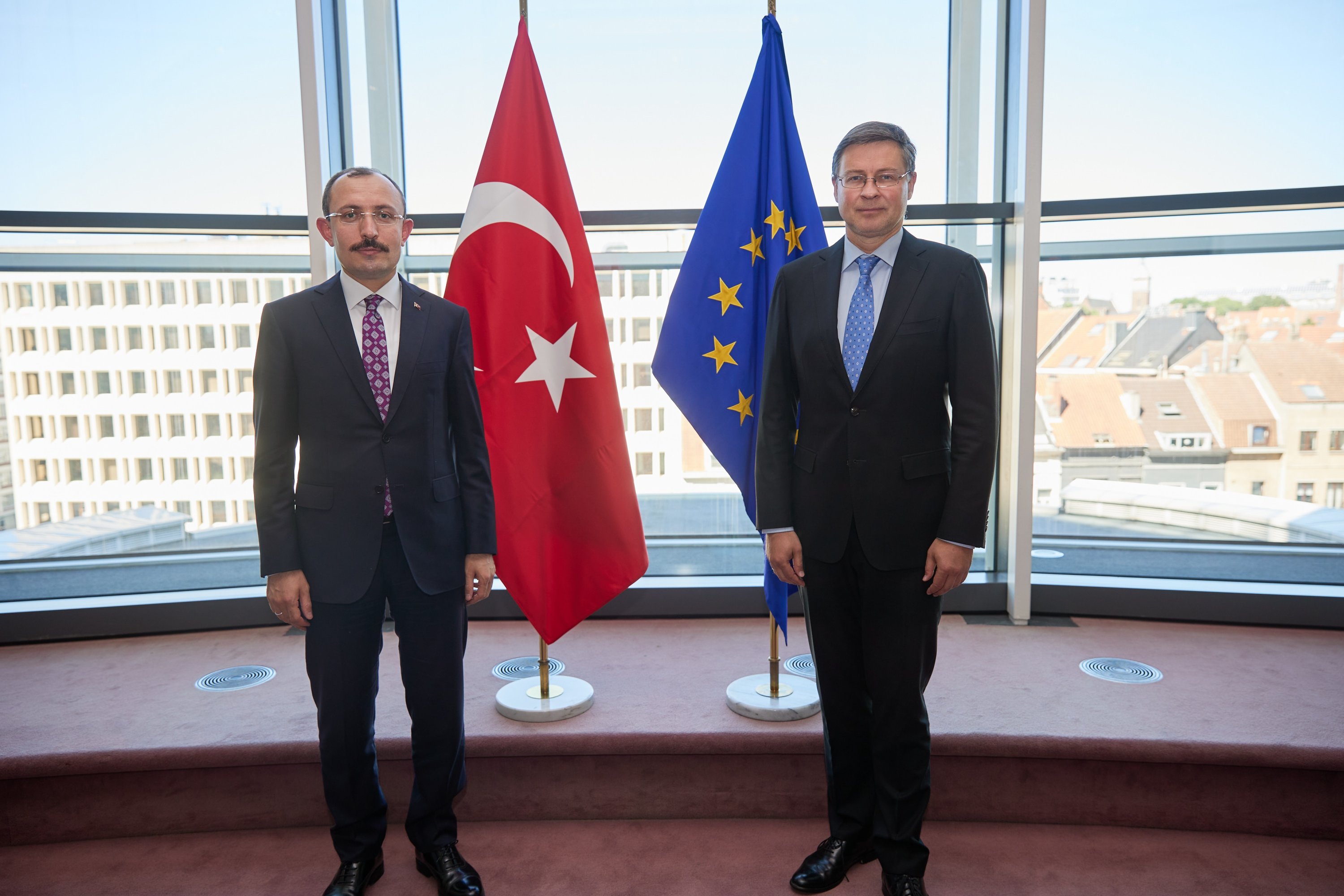© Turkuvaz Haberleşme ve Yayıncılık 2024
Turkey Tuesday once again reiterated the view that an expanded European Union-Turkey Customs Union deal with its largest market, Europe, would be in the best interest of both sides.
Launching negotiations to update its content offers a set of fresh opportunities and would carry even further the commercial and economic relations between Turkey and the EU, Trade Minister Mehmet Muş said, following his visit to Brussels.
“Updating the customs union is economically beneficial for both Turkey and the EU. Everyone agrees here,” Muş told reporters.
His remarks came after he met with the EU's trade commissioner and European Commission vice president, Valdis Dombrovskis, and EU Commissioner for Economy Paolo Gentiloni on Monday.
“We held very fruitful negotiations in which we discussed trade and economic relations and the positive agenda between Turkey and the EU with the two most important names responsible for the economy and trade of the EU,” the minister said.
The host of disagreements between Ankara and Brussels over recent years has been stalling the negotiations for the modernization of the customs union. A deeper 1990’s-era trade agreement would be expanded to services, farm goods and public procurement.
The customs union expansion would bring Turkey, an EU candidate for membership of the bloc, fully into the internal market of the world’s largest trading bloc, allowing almost all goods and services to flow unhindered.

'Hitches, problems in application'
Muş said making the deal suitable for today's commercial and economic conditions constitutes an important element of the positive agenda between the sides.
“There are hitches, problems in application. This is also accepted by the EU,” the minister said.
“The process of updating the customs union will further improve relations between Turkey and the EU in the trade and economic area, offering economic benefits for both sides.”
He emphasized that challenges brought along by the coronavirus pandemic, as well as the uncertainties in the global trade and economy in recent years have showcased a larger-than-ever need for Turkey-EU cooperation to be developed based on common interests.
Following a turbulent year in 2020, Ankara and Brussels have been voicing their intent to readjust relations and return to a positive track in bilateral ties.
Yet the process remains highly fragile. EU leaders declared in March that they are prepared to boost trade and extend a 2016 migration pact with Ankara, but warned of sanctions if Turkey resumes what the bloc perceives as “illegal” energy exploration in the Eastern Mediterranean.
EU member states Greece and the Greek Cypriot administration have been clashing with Turkey over maritime boundaries and natural gas reserves in the Eastern Mediterranean.
Turkey, the country with the longest coastline on the Eastern Mediterranean, has sent drillships with a military escort to explore for energy on its continental shelf to enforce its and the Turkish Republic of Northern Cyprus's (TRNC) rights in the region.
France, Greece and the Greek Cypriot administration have been the biggest advocates of taking a hard line against Turkey, yet other EU states led by economic powerhouse Germany have leaned toward a more diplomatic approach so far.
Following their latest summit in late March, EU leaders said that their experts can work on a mandate for the modernization of the customs union. No major breakthrough has been disclosed yet.
EU leaders are to gather again in Brussels June 24-25 and Muş said Ankara expects it to yield a positive outcome, particularly regarding the customs union.
Muş noted that during his talks, there was a strong determination on the EU side to further develop economic relations with Turkey.
“The future of economic relations with our country will be discussed at this summit, among others. During these contacts held before the summit, we observed that there is a consensus on the importance of strategic cooperation between the EU and our country and that it is in the interest of both Turkey and the EU to establish a positive agenda,” the minister said.

Turkey is the only non-EU country with a customs union agreement with the bloc. The deal was struck in 1995. In its Dec. 21, 2016 assessment, the European Commission proposed revamping the deal.
The current customs union agreement only covers a limited range of industrial products and excludes agriculture, public procurement, e-commerce and services.
The inclusion of these sectors is estimated to lift bilateral trade between Turkey and the EU to over $300 billion, a substantial increase from the current $165 billion.
Muş further noted that it is in the interest of both sides to work together and cooperate in solving global and regional issues.
In terms of diversifying and strengthening global supply and value chains, the minister said Turkey is the “most important partner for the EU with its production and export capacity, dynamic economy and strategic location.”
“A stronger Turkey-EU integration creates important opportunities for strengthening supply chains in our region and further increasing their competitiveness,” he added.
